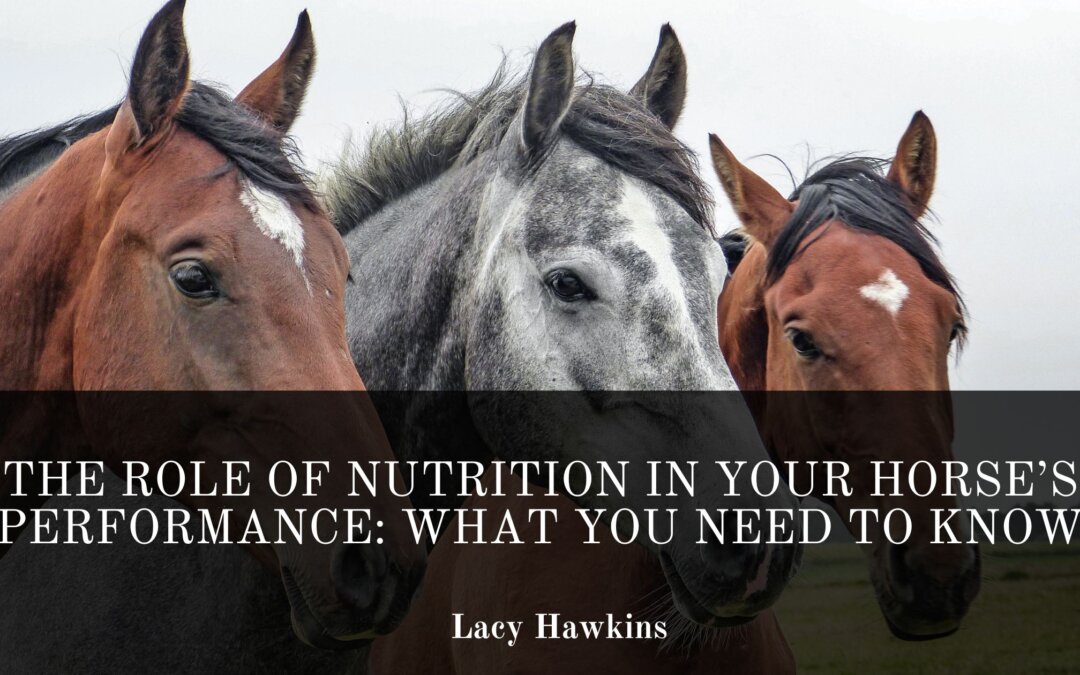Proper nutrition is one of the most important factors influencing your horse’s performance, health, and overall well-being. Just like athletes, horses require the right balance of nutrients to maintain energy, build muscle, and recover from physical exertion. Whether you’re a competitive rider, an amateur, or someone who enjoys horseback riding as a hobby, understanding the role of nutrition can help you optimize your horse’s performance and ensure they remain healthy and fit. Here’s what you need to know about the vital role nutrition plays in your horse’s performance.
1. Understanding the Basic Nutritional Needs of Horses
A horse’s diet consists of several key nutrients: water, carbohydrates, fats, proteins, vitamins, and minerals. Each of these plays a unique role in maintaining your horse’s energy levels, muscle function, and overall performance.
- Water is the most important nutrient. Horses need an ample supply of fresh, clean water to stay hydrated, regulate their body temperature, and aid digestion. Dehydration can quickly lead to poor performance and even serious health issues.
- Carbohydrates are the primary energy source for horses, providing fuel for physical activity. These can be found in hay, grains, and forage. Depending on the intensity of work, your horse may require a higher carbohydrate intake.
- Proteins are essential for muscle repair and growth. Horses involved in strenuous exercise need higher protein levels to support muscle recovery. The protein found in high-quality forage or specialized feeds can provide these needs.
- Fats provide a concentrated source of energy and support the absorption of fat-soluble vitamins. Adding healthy fats to your horse’s diet can improve endurance and support a glossy coat.
- Vitamins and minerals play a role in maintaining bone health, muscle function, immune support, and overall performance. A balanced mineral supplement can be crucial, especially if your horse’s diet lacks certain minerals due to local soil deficiencies.
2. The Impact of Nutrition on Energy Levels
Just like human athletes, horses require the proper fuel for optimal energy levels. Horses used for performance or competitive events—such as jumping, dressage, or racing—have higher energy demands than those used for casual riding.
The primary energy source for horses is carbohydrates, which are broken down into glucose for immediate energy or stored as glycogen in the muscles for longer-term use. Depending on the level of activity, your horse may need additional carbohydrates or fats to maintain energy during training or competition.
For example, horses involved in intense physical activity may require a higher intake of grains and fats to ensure they have enough energy to perform at their best. On the other hand, for horses doing light work, a diet rich in fiber and forage might be sufficient.
3. Muscle Recovery and Protein Needs
Horses that participate in rigorous exercise require adequate protein to repair and build muscle. Protein provides the building blocks for muscle tissue, and after intense physical exertion, your horse’s muscles will need extra support to recover and grow stronger.
A diet high in protein, specifically amino acids, can support muscle repair. Horse owners can offer protein-rich hay, alfalfa, or specialized feeds designed for performance horses. It’s important to provide enough protein without overdoing it, as too much can strain the kidneys and lead to other health issues.
4. The Importance of Balanced Diets for Joint Health
Performance horses put a lot of strain on their joints, so it’s essential to support joint health through proper nutrition. Certain nutrients, such as glucosamine, chondroitin, and omega-3 fatty acids, help maintain joint integrity, reduce inflammation, and prevent joint wear and tear.
Supplements with these ingredients can be beneficial, especially for horses engaged in high-impact sports. Additionally, feeding a balanced diet with the proper minerals like calcium and phosphorus will help maintain bone strength and support joint function.
5. Tailoring Your Horse’s Diet for Their Workload
Each horse has unique nutritional needs based on their level of activity. A horse’s workload directly affects their energy and nutritional requirements. A well-balanced diet tailored to the horse’s activity level will ensure that they remain in peak condition.
For example:
- Light work (such as casual riding or trail riding): Horses may only need basic forage (hay or grass) along with a vitamin and mineral supplement.
- Moderate work (such as flatwork or jumping): In addition to forage, they may need a combination of grains and specialized performance feeds.
- Intense work (such as racing or heavy training): Horses in these categories will require higher energy feeds, possibly supplemented with fats and electrolytes to maintain stamina and avoid dehydration.
6. Monitoring Your Horse’s Condition
Regularly monitoring your horse’s condition—both physically and nutritionally—is key. Keep an eye on their weight, coat condition, muscle tone, and overall energy levels. If your horse seems sluggish, has trouble recovering from exercise, or shows signs of muscle soreness, you may need to adjust their diet.
Consulting with an equine nutritionist or veterinarian can help you make informed decisions about the specific dietary needs for your horse, particularly if you notice performance issues or changes in their condition.
Conclusion
Nutrition is the foundation of your horse’s performance, health, and longevity. By providing the right balance of water, carbohydrates, fats, proteins, vitamins, and minerals, you can optimize your horse’s energy levels, enhance their muscle recovery, and support joint health. Tailoring their diet to their level of activity and monitoring their condition will ensure that your horse is in top shape for every ride, training session, or competition. Remember, a well-fed horse is a happy and healthy horse, capable of performing at their best.
